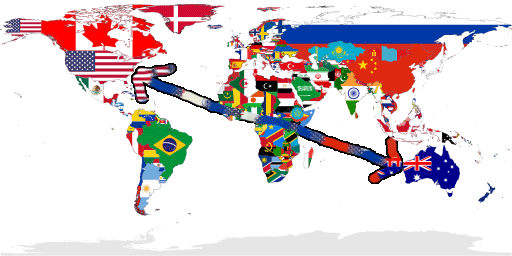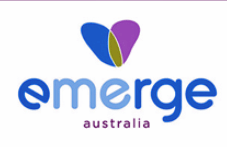
The US and Australia link up via the You+M.E. Patient Registry.
It was only a matter of time before this happened. The Solve ME/CFS Initiative’s You+M.E. Patient Registry, after all, wants to take over the world. They want every single person with ME/CFS – anywhere – to be in it. I get it. I want the same.
This thing is too important, too loaded with possibilities to stop at something like a boundary line. It’s Australia that gets the distinction of being the first You+M.E. international partner.
(A nice kind of symmetry has developed: there’s the U.S. on the upper left and Australia on the lower right – now it’s just a matter of getting everyone in between. Just a couple hundred countries to go…)
This is not to say that it’s easy to leap outside the U.S. It’s just worth it to do it. Sadie Whittaker, the Chief Scientific Officer for the Solve ME/CFS Initiative, told me that first they had to build a Australian You+M.E. cloud to store the Australian data, and then get the U.S. You+M.E. cloud to talk to it (or something like that.)
However they did that, for the first time, the 240,000 or so people with ME (myalgic encephalomyelitis) in Australia have a new opportunity. They can now power ME research – simply by signing up and answering some questionnaires. If they want to, they can also use the Patient Registry’s handy app to chart how well they are doing, and what works and doesn’t work.
Please Join the You+M.E. Patient Registry
The reason every major disease has a Patient Registry is that they work – plain and simple. If you want progress – you build a Patient Registry. They’re a foundational part of any comprehensive disease research program. Besides providing insights no other program can, they also reduce research costs, and simply by drawing researchers to them, they can dramatically increase research funding. In ME/CFS’s case they could also finally lead pharmaceutical companies to our door.
That possibility especially entices Solve M.E.’s Sadie Whittaker, who has been working on the Registry for four years. Big data, she said, transformed the cancer field she worked in. The large data sets from cancer patient registries allowed cancer researchers to get precise and tease all sorts of subsets, and then target them with therapies.
If any disease needs its subsets to be teased out, it’s the “wastebasket disease” par excellence.
For us to do that it’s going to require getting in-depth data from large numbers of people with ME/CFS and following them over time. There’s enormous power in numbers. So much power that the Solve ME/CFS Initiative hired a full-time researcher – Elle Seibert – to tease out its secrets.
There will be many. Just the first cut of the data should be able to answer questions like these:
- What happens over time to people with ME/CFS and/or long COVID?
- Does quality of life or functionality decline over time, or does it plateau?
- Do people with ME/CFS die earlier? (Let’s hope for a negative answer.)
- What about the typical comorbidities – FM, POTS, migraine, IBS, environmental illness, etc. – are there subsets embedded there? Is my ME/CFS with my environmental sensitivities different from yours with your migraines and gut problems?
- How does ME/CFS compare to long COVID? How do the long, long (long) ME/CFS patients compare to the long-COVID patients?
- Does the type of illness onset matter? Are people with infectious illness onset different than people with gradual onset?
- How are long COVID and people with ME/CFS doing with the coronavirus vaccinations?
So far, 2,400 ME/CFS patients and 540 long-COVID patients in the U.S. have signed up. That’s a start, but this thing really only gets cooking when tens of thousands of people have donated their data to science.

The difference the You+M.E. Patient Registry will make will only be as big as the community support that it gets, though. The NIH has asked us to deliver for years, and now with the Registry, we have. Establishing it was the first step. Now we need to deliver. We need to give it our precious data.
If we fully participate in the Registry, it will help to produce answers that this disease vitally needs. If not, we will continue on as we are.
Can you say bye-bye wastebasket illness – hello legitimacy, drug development, more research funding? That’s what the Registry is about.
Emerging Indeed

Emerge has, well, really emerged!
The Solve ME/CFS Initiative found a great first international partner in Emerge Australia. I first heard of Emerge a couple of years ago. Since then, their funding has dramatically increased, they’ve put on a 3-day conference, established a research group, and now created the first You+M.E. portal outside the U.S.. In other words, they’ve really emerged.
In partnership with the Open Medicine Foundation (OMF), this year Emerge created Open Medicine Foundation Australia and Melbourne ME/CFS Research Collaboration led by Chris Armstrong. As the fifth international research center in the OMF’s network, Emerge just became “part of the largest, concerted worldwide non-profit effort to diagnose, treat and find a cure for ME/CFS”.
Then in April, Emerge opened the Australian version of the Solve ME/CFS Initiative’s You+M.E. Patient Registry. Next up is producing the Mason Foundation-funded ME/CFS Biobank which will link to the You+M.E. Patient Registry Australia.
More Emerging Possibilities

The Registry is eager to get your data.
Long COVID – The possibility of studying large numbers of ME/CFS and long COVID patients side by side is tantalizing, indeed. In fact, the You+M.E. Registry may be the only place where it’s possible to do that right now – making it a precious resource not only for ME/CFS but for long COVID researchers.
Not only is the Registry open to individual long COVID patients but it’s ready right now to engulf, ingest, digest – however you want to put it – large amounts of data from other long COVID tracking efforts. Find more about that here.
- Next up for the You+M.E. Registry – the UK. (UK residents can get updates here.)
- The Patient Registry is coming. Sign up to get updates here.
Whether you’re in the U.S. or Australia,
Whether you have ME/CFS or Long COVID
Please Join the You+M.E. Patient Registry







Not about the blog, but I want to report on my further personal efforts to discover the underpinnings of my pervasive fatigue.
I recently finished an overnight polysomnography and finally got my results–my sleep was constantly disturbed by ‘respiratory events’ and hypopnea with 22 events with 9 arousals–but these do not qualify as apnea. They are more in the range of UARS (Upper Airway Resistance Syndrome) which is relatively common in Ehlers-Danlos. Our tissue laxity evidently contributes to not enough oxygen getting into our blood and instead of stopping breathing, like with apnea, we wake up before our oxygen dips too much. That can cause a lot of awakenings!
Mostly this problem is overlooked or not detected in traditional sleep tests. In fact, insurance and Medicare do not recognize that it needs to be treated although a growing body of evidence shows otherwise. I’m also reading that people with UARS do not take kindly to using C-Paps.
So, no recommendations except another sleep study and possible help for my ME/CFS is tantalizingly close, yet still out of reach.
Thanks Nancy. Fascinating the connection between UARS and EDS and hypermobility. I remember reading that UARS is greatly underdiagnosed.
Next up You+ME Registry UK, Can’t wait. Of course the Decode ME participant’s info and specimens will be available to interested researchers, anonymised of course. BUT, That’s not even starting collecting specimens until Sept 2021 at least. And another biobank is not receiving specimens, I brain fog get which.
Dr Alain Moreau is running more studies in Canada, on PEM, with nurses making visits to participants, collecting data before during and after stress induction with a hexoskin vest.[ webinar vimeo to be available soon on actioncind.org Recent Advances in Understanding ME….. May Awareness]
Prof Simon Carding of the Quadram Institute in Norfolk UK, will be conducting a study on the Microbiome again with nurses visiting participants.
3 good opportunities for recruitment , specimens, questionnaires, including severely affected ME/CFS ers, and data sharing.
Is Canada on THE LIST? We need to get a joined up
WW.ME/CF//FM/CIND.COM(munity)
How great that the Registry showed up in time for them to hook up with DecodeME. Talk about synergy and symmetry! The next line on the map will probably make a nice triangle – the US to UK to Australia and back to the US 🙂
Canada is DEFINITELY on the list.
Right next door, all you have to do is look up and there it is—-Canada. Why are Australia and the UK on the registry yet Canada is not? Are we really that invisible to Americans?
I know! What about Canada! My partner is up there and I’ve forwarded her personal request to Sadie that the Registry go North…Every time I talk to her Sadie tells me tell your partner – we’re working on it.
I don’t know what it takes actually. Solve ME was fortunate enough to find a strong partner in Emerge which was able to facilitate the partnership. I’m sure that helped. I will try to find out, though, what it takes to add a country to the Registry. It may differ from country to country.
and here in belgium the goverment still says only a few get and cbt sessions, is the only proven thing that helps and further nothing happens
i can not wait any more on long data anyway, am way to ill and still declining, i know where this ends… i am even be to ill to use the registry so the really severe patients are left out…
Thank you.
konijn,
what i am hopedul for is that Alain Moreau has the vision.
because of his and his group’s innovations, progress is being made.
while i inly know of Moreau’s, his studies are going to lead the way in collecting databfrom bedridden patients.
from what i see, i have made a leap of faith.
i have faith that as soon as Moreau realistically can, the ‘Moreau Protocol’ will be spread to collect samples.
For the ‘exercise’ stimulus Moreau’s group uses is portable, (a vibrating cuff)
and
the samples pre and post ‘cuff induced exercise’ is leaning more towards saliva samples — which are portable, too!
My thought is this portability will be a game changer for testing.
With the linking of OMF groups with ME Registry, i belief their combined wisdom will seive data. Resulting in “identifiable” disease. ( DIAGNOSTIC tests ).
Diagnostic tests that are PORTABLE.
This is an addendum to my original personal report of Upper Airway Resistance contributing to my constant state of fatigue. This time, it does have some (very vague) relationship to the topic at hand–namely Australia.
In my never-ending research, I came across learning to play the didgeridoo as an effective therapy for apnea and UARS. So, I got a section of vacuum cleaner tube and looked up instructional videos on youtube and began…
Yes, I sound like a sick moose, and it is very difficult to learn the proper technique–especially circular breathing (I’m a long way from figuring that out). After only a week, I am noticing pronounced changes in my sleep quality and my–energy!
You know how some ME/CFS theories talk about poor oxygen distribution/circulation, small heart, sticky blood, low blood volume, poor muscle function and all of that…well breathing is the great conveyer of oxygen. I’m getting this idea that the difficult and tricky technique of playing this ‘instrument’ may help with all of that and I suspect it might also be stimulating the vagus nerve. And for me, it’s fun too–although my partner doesn’t like it much…
I’m so surprised at the results, I am excited to share. I will be continuing– and look forward to getting a ‘proper’ instrument.
So far down under doesn’t extend to New Zealand. Waiting for a response from the Registry.